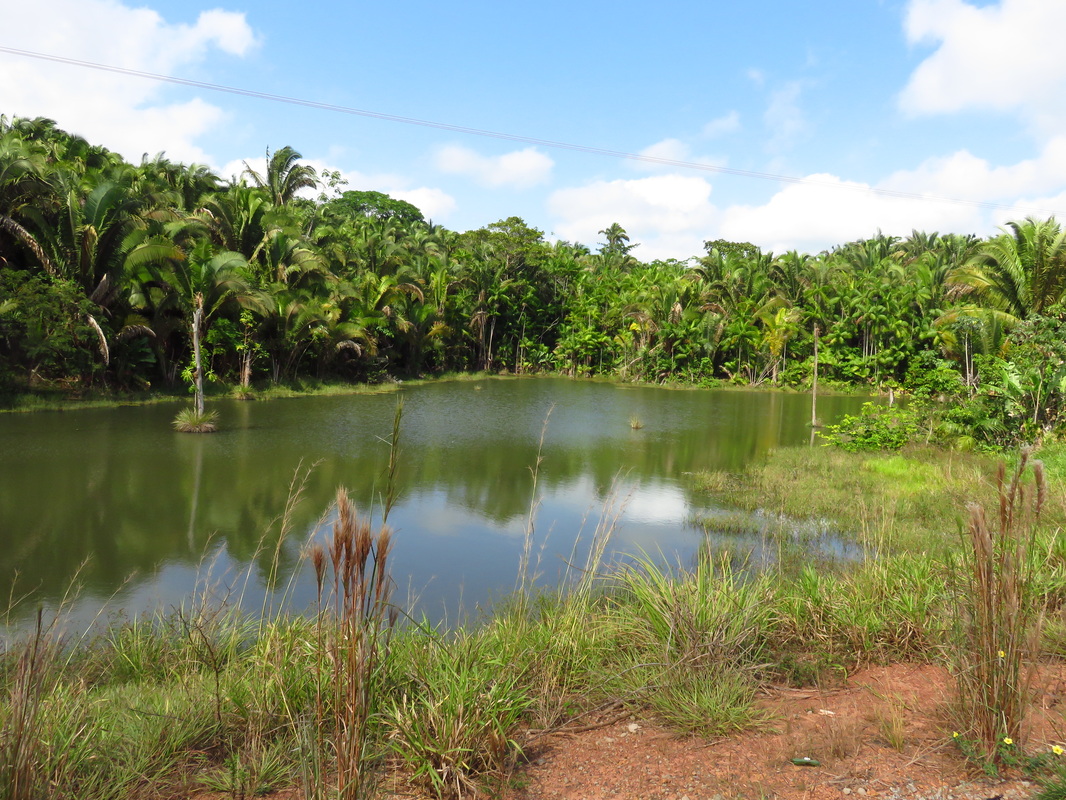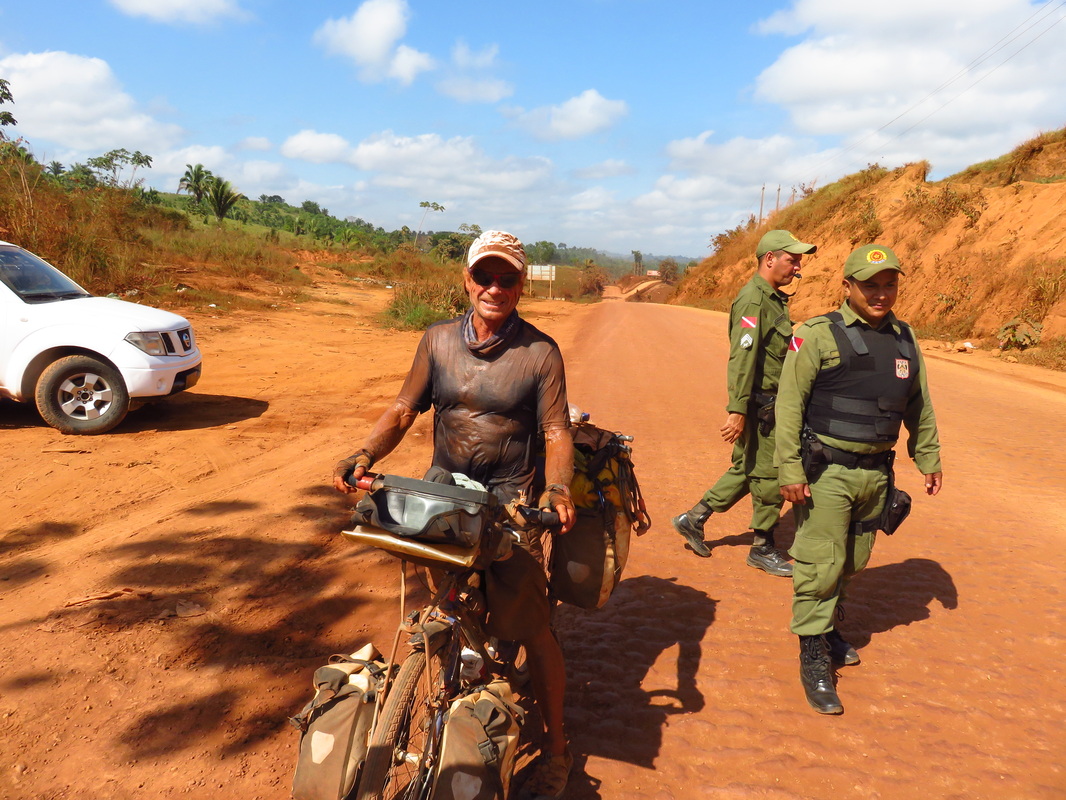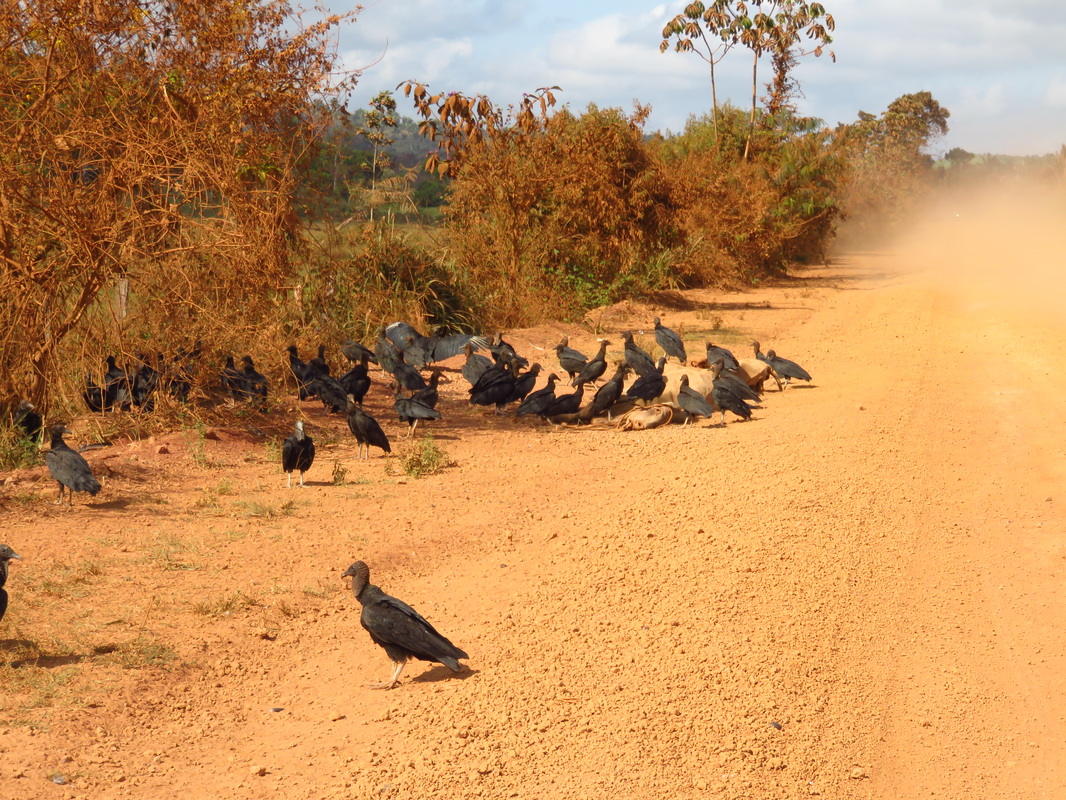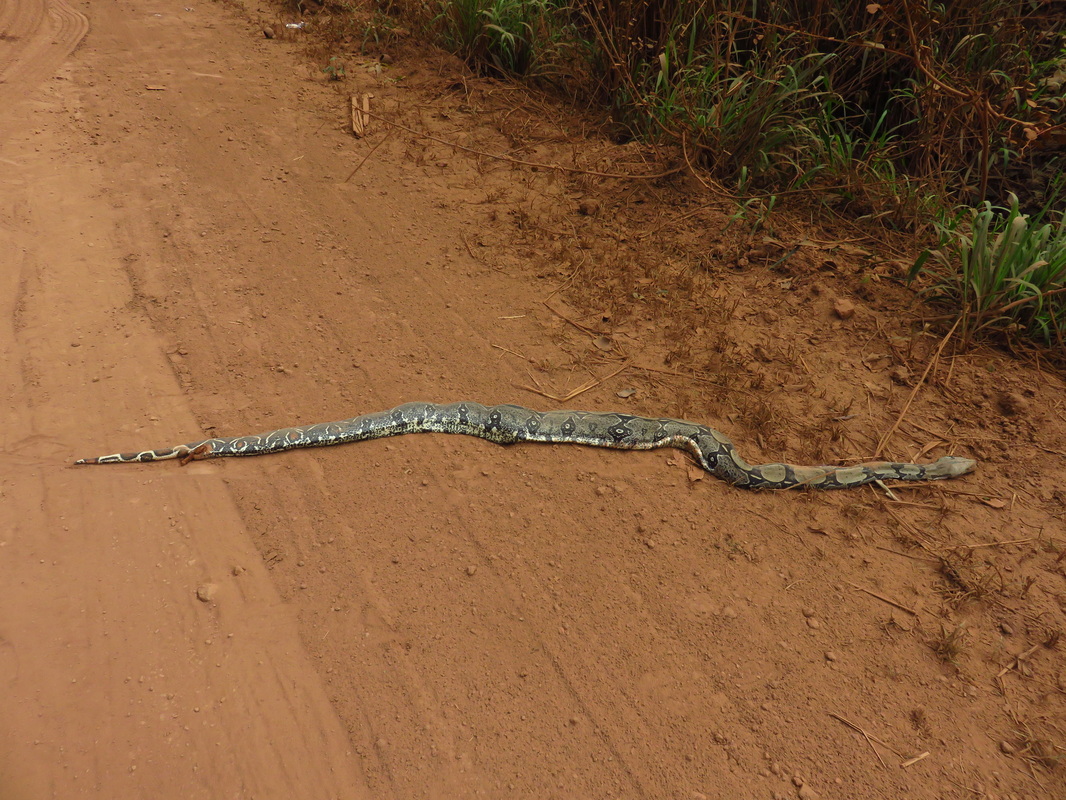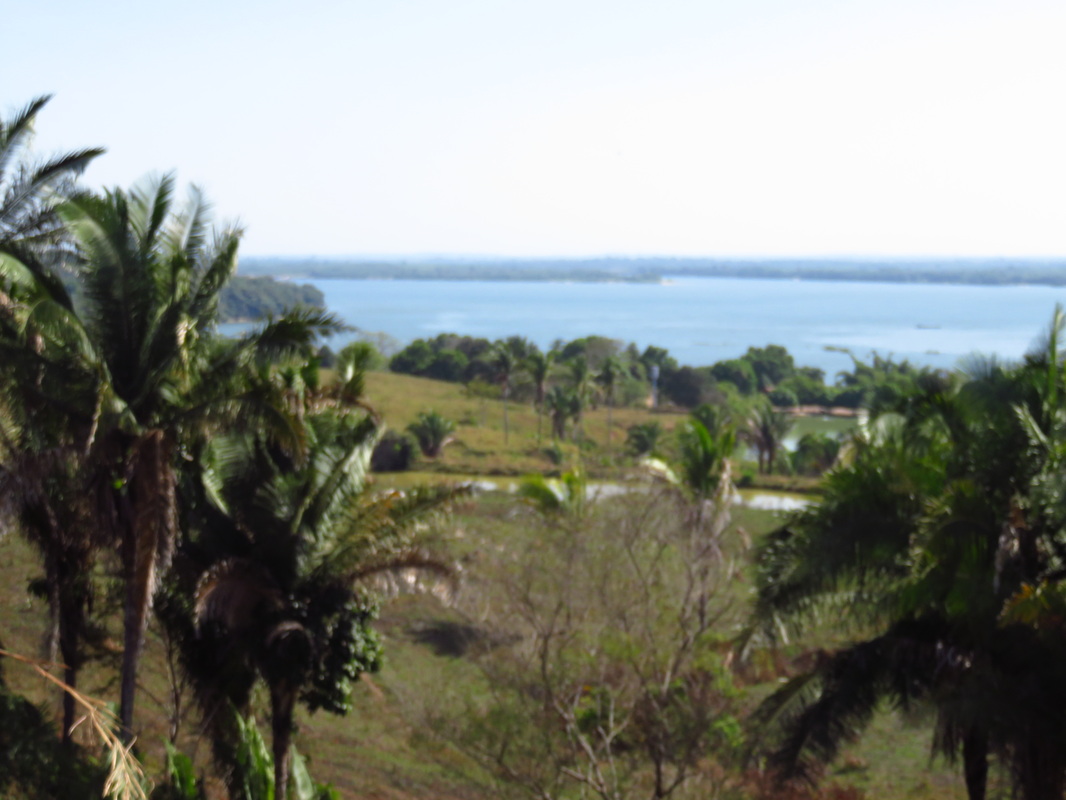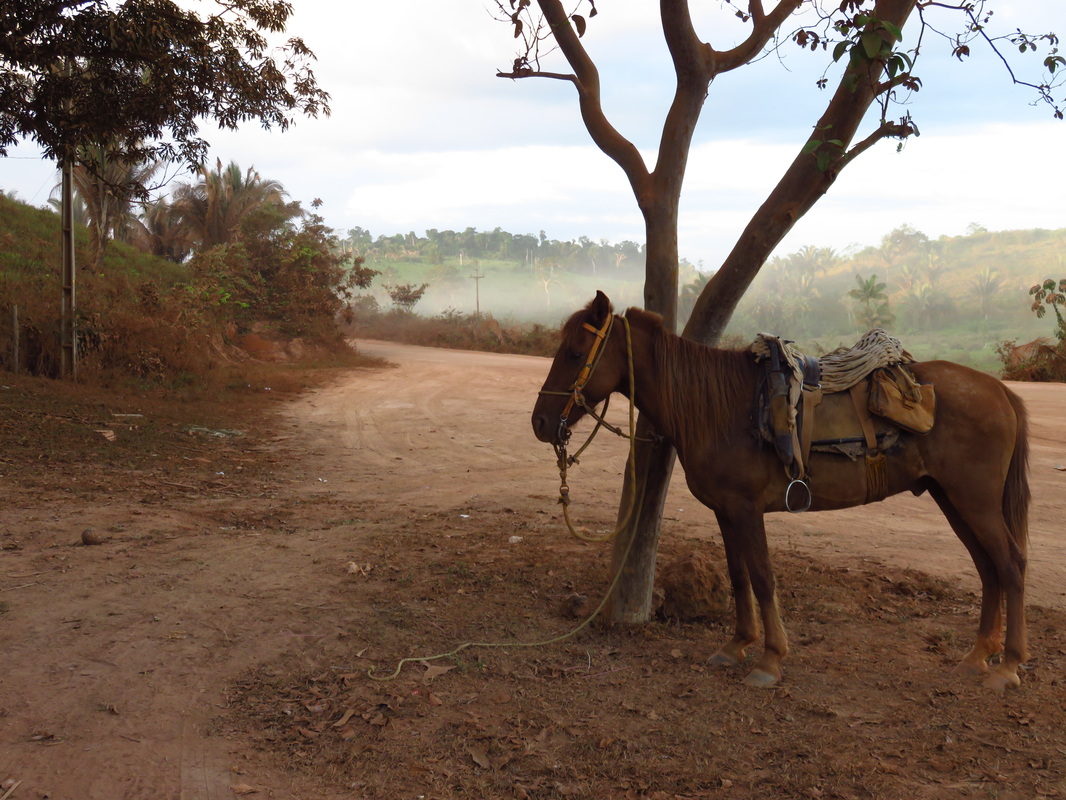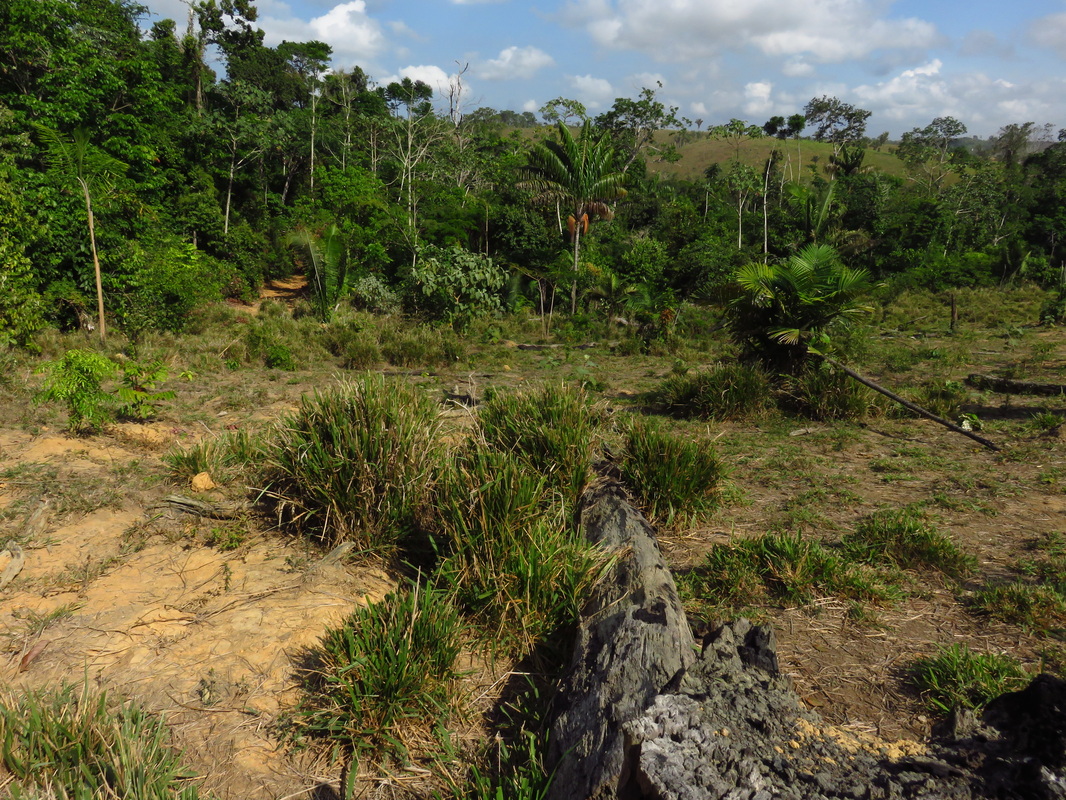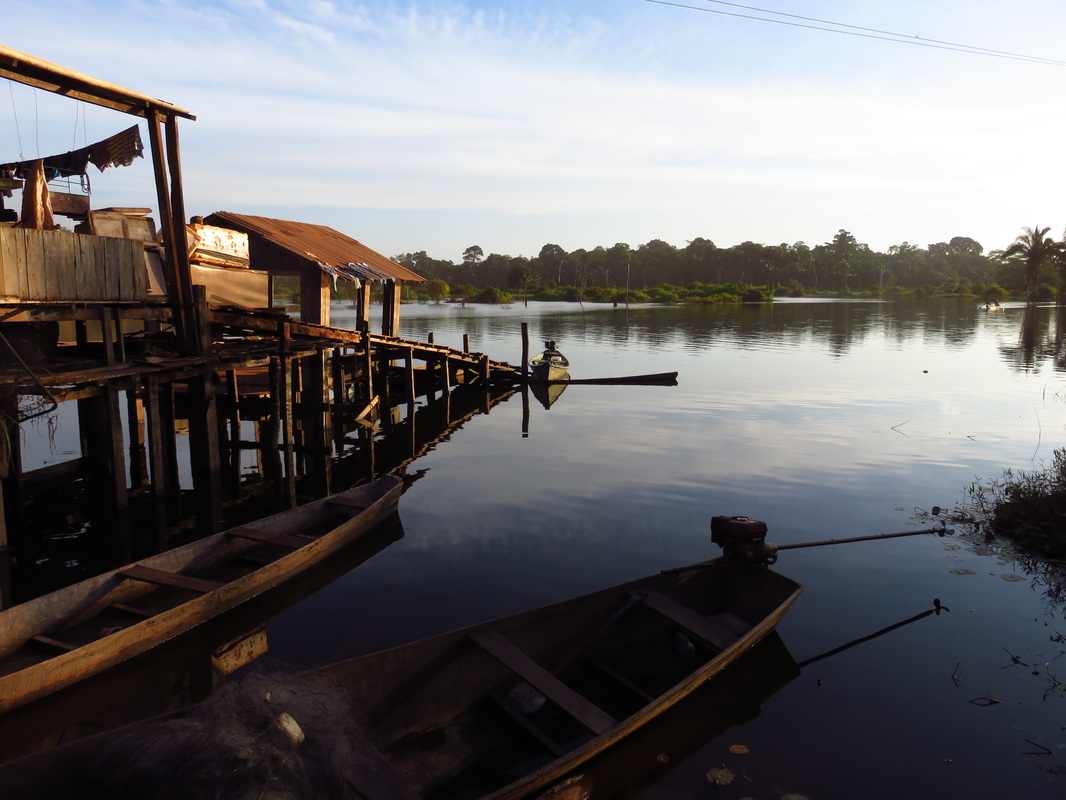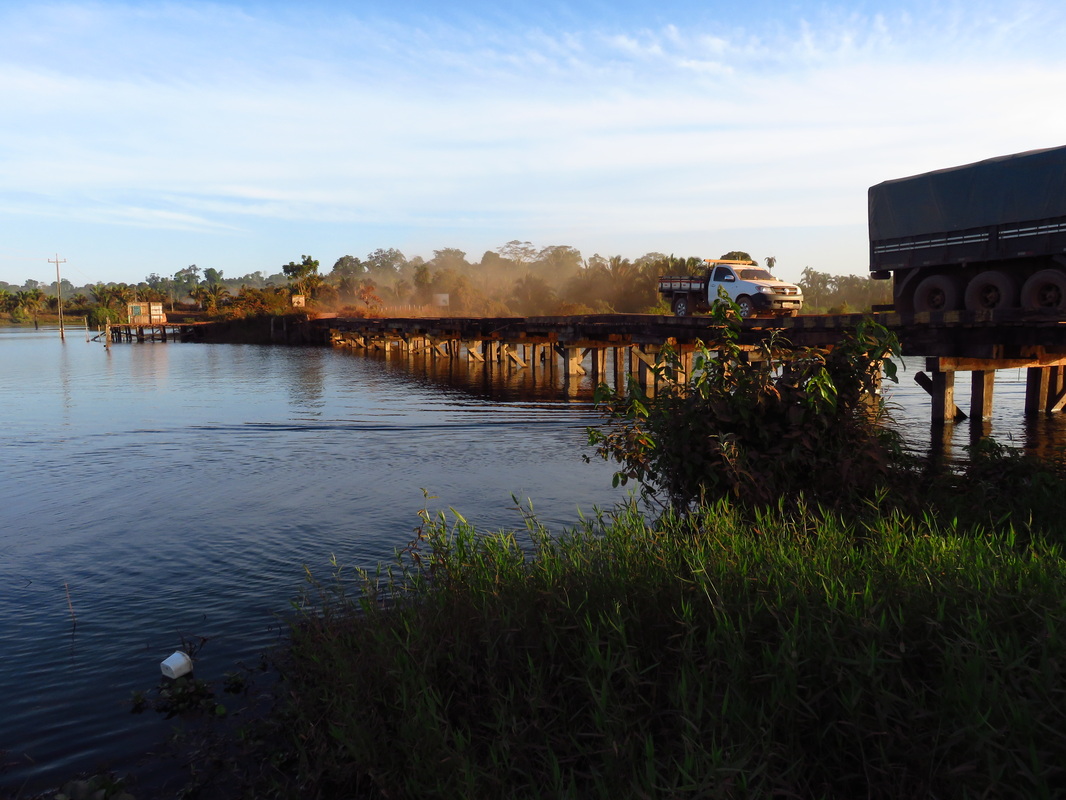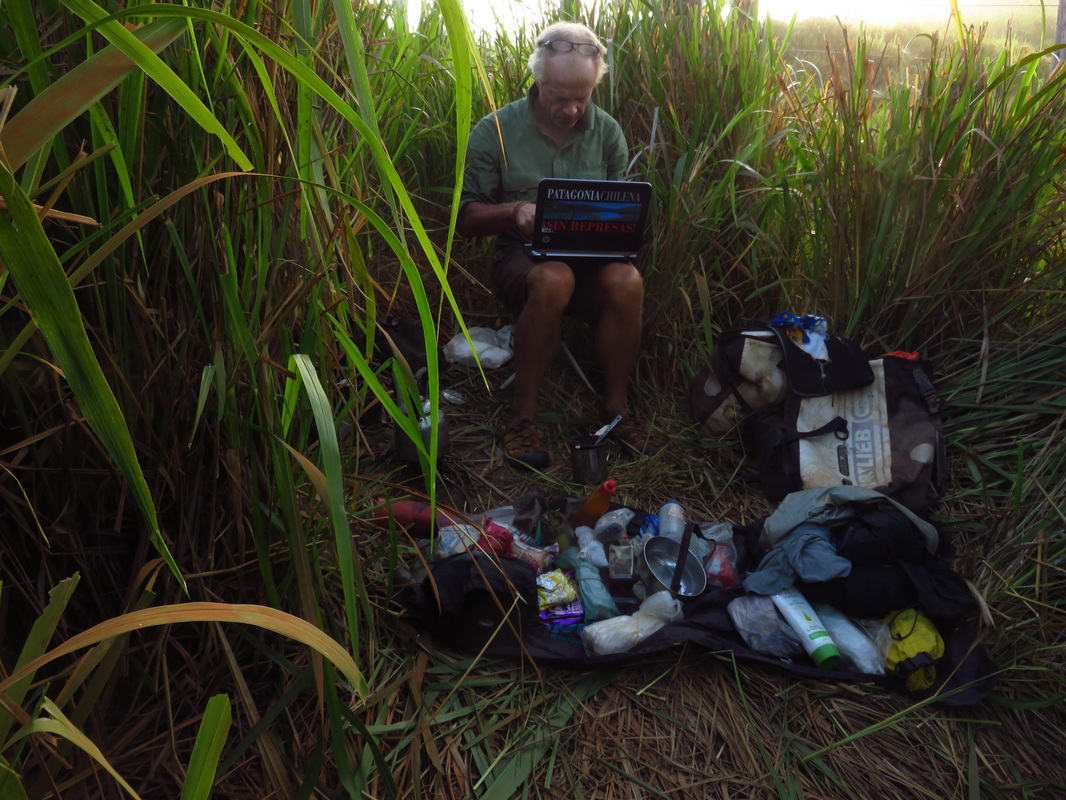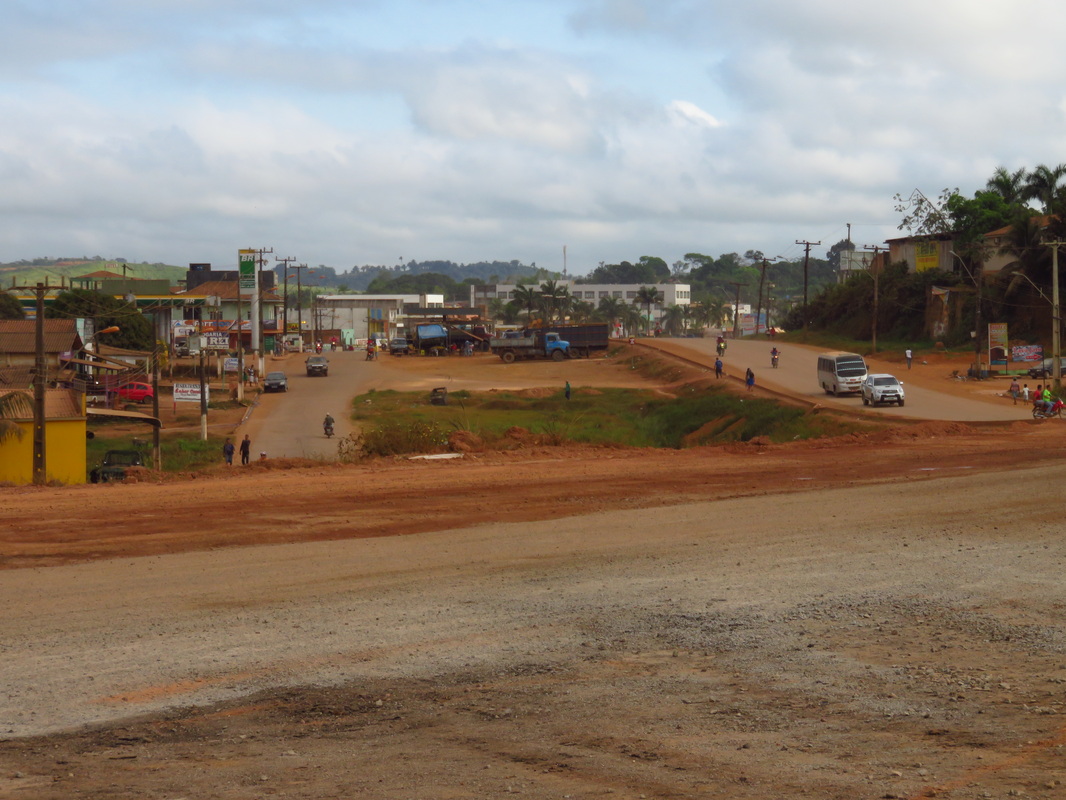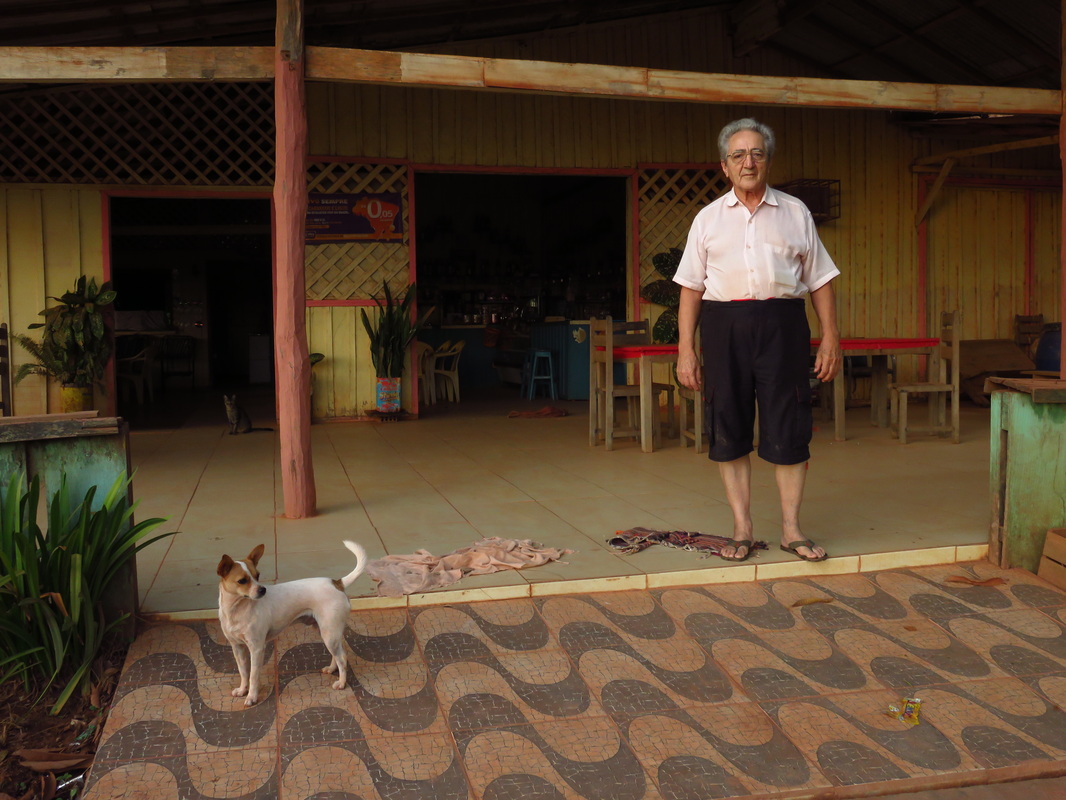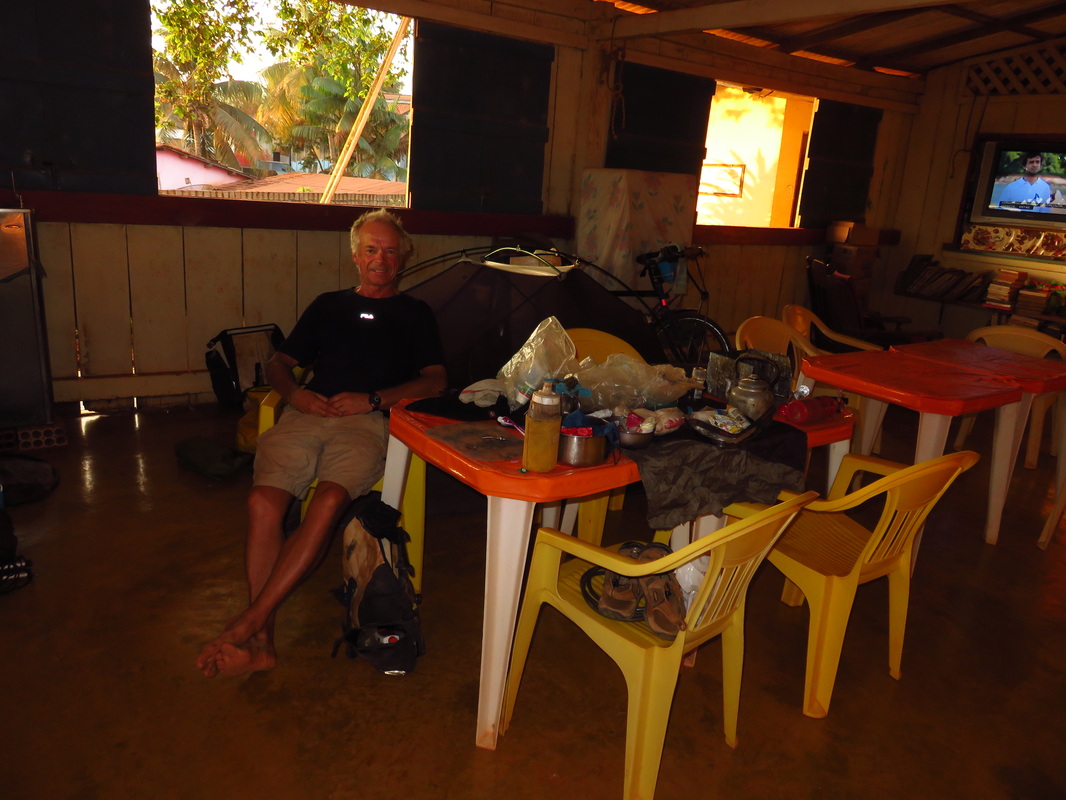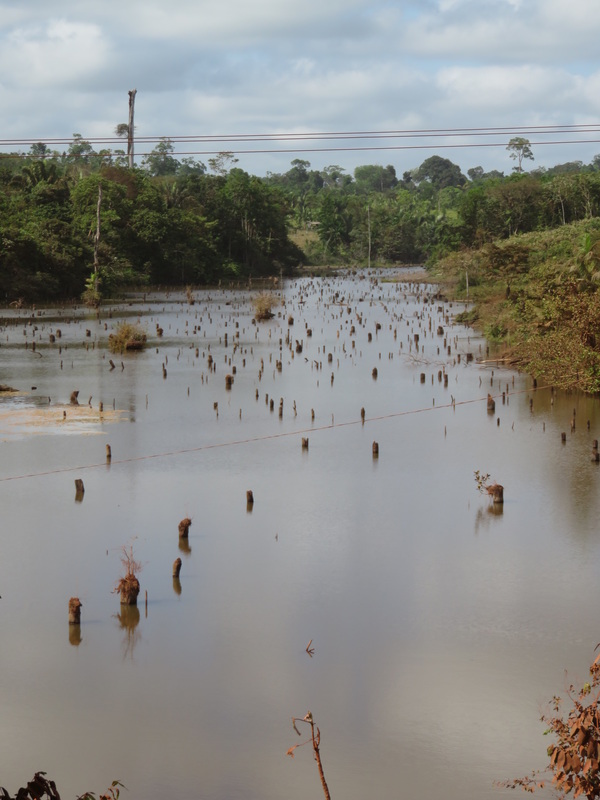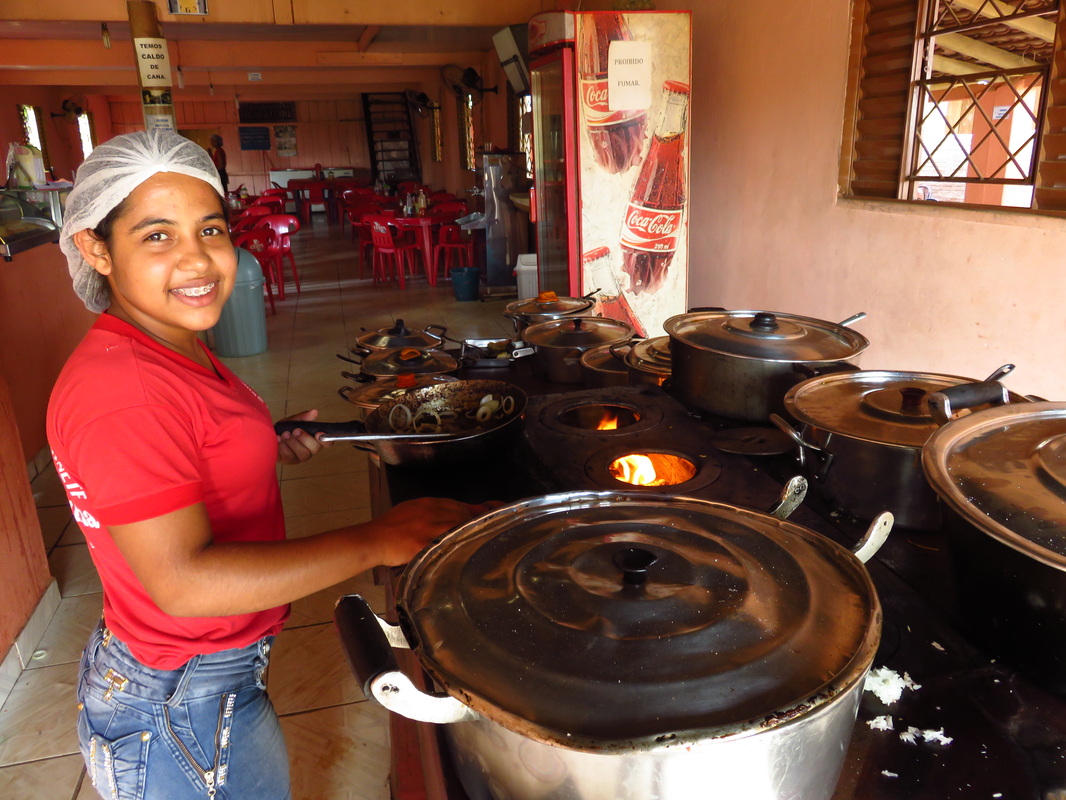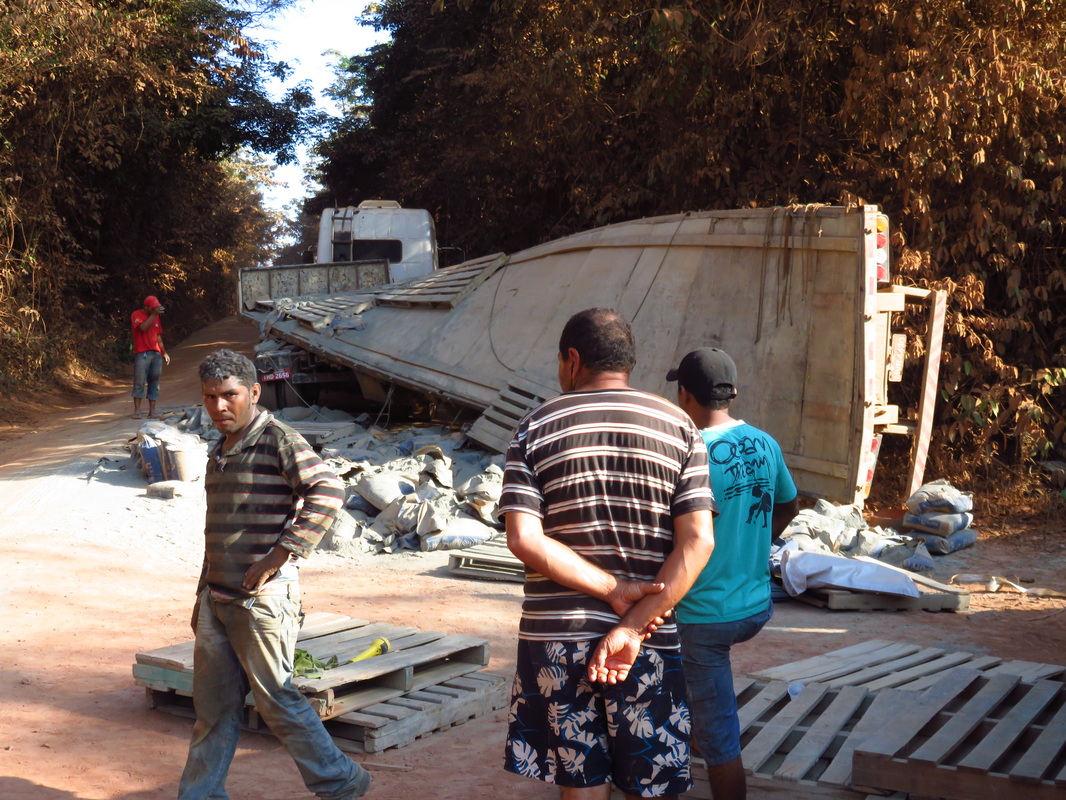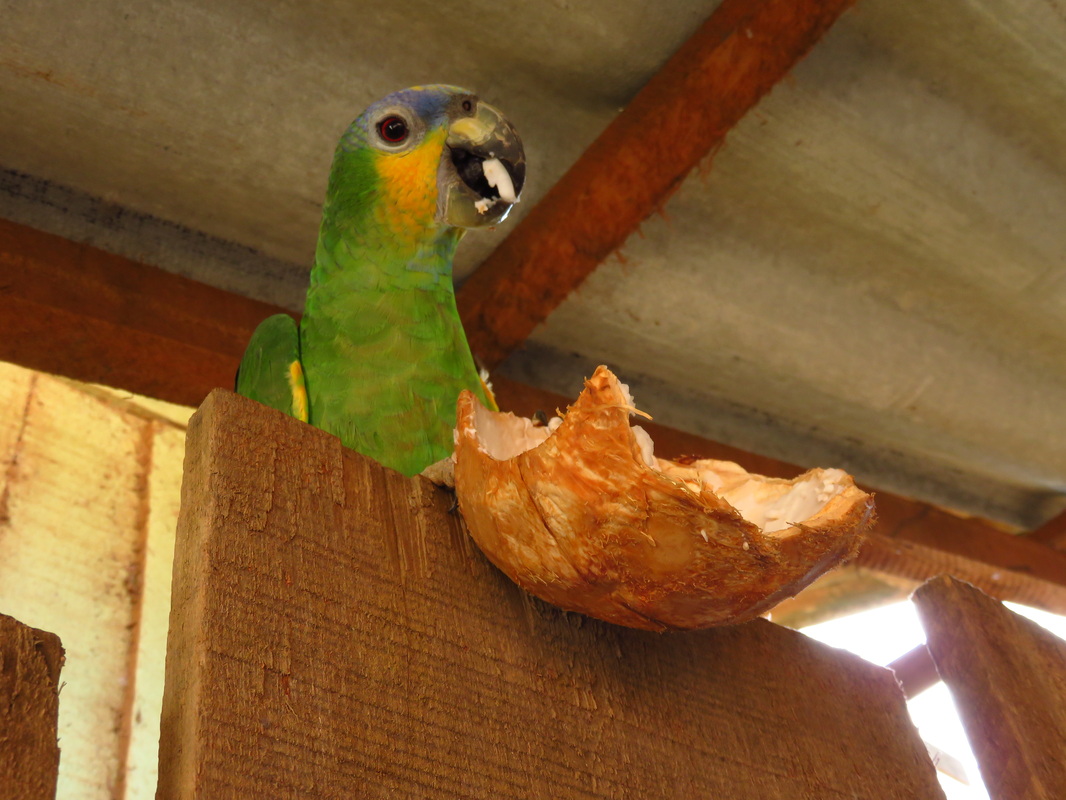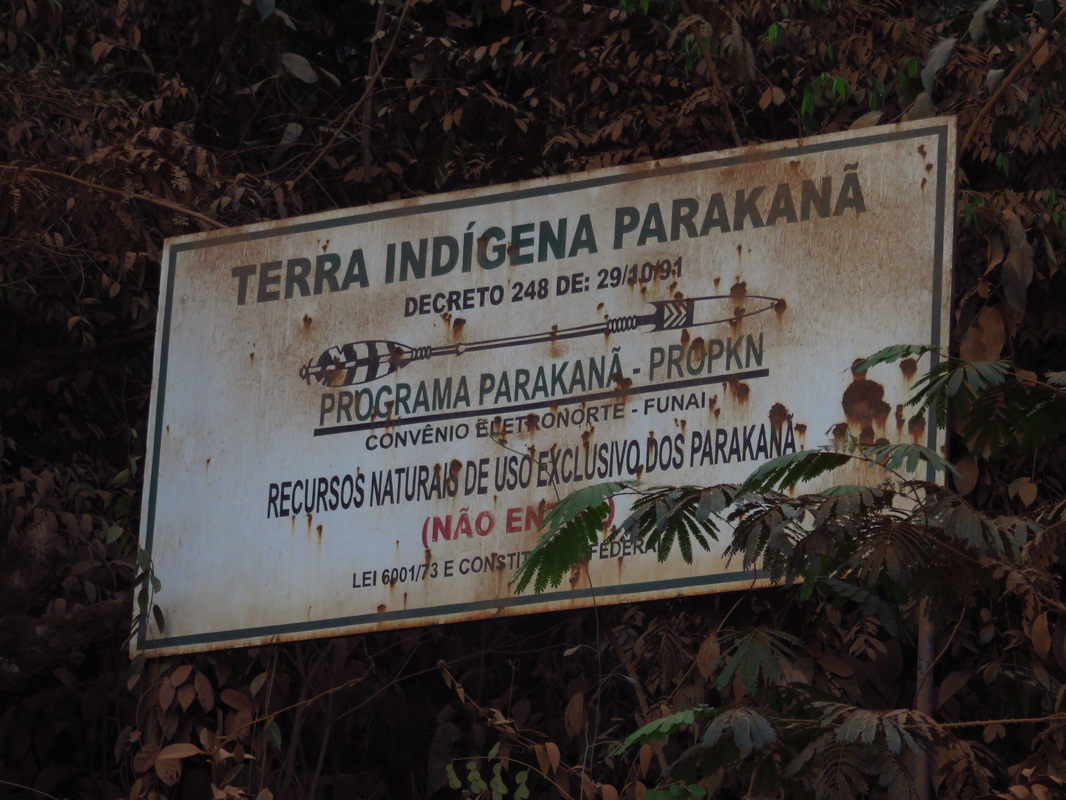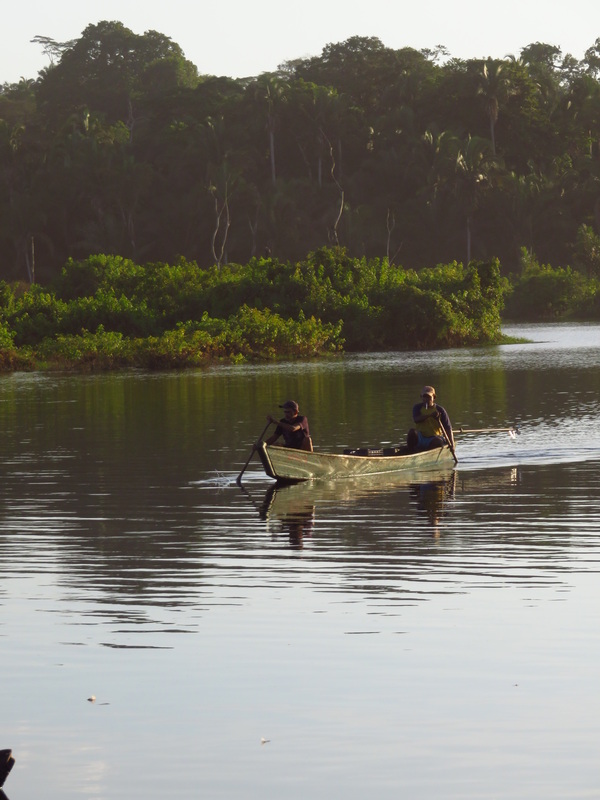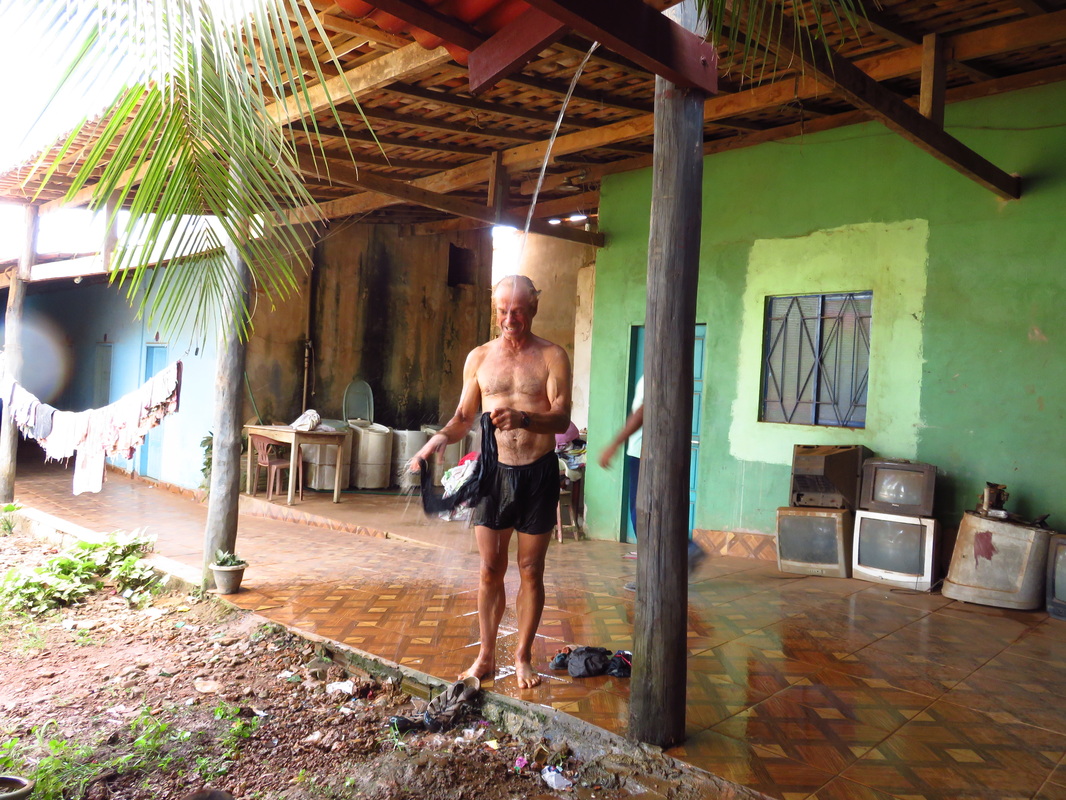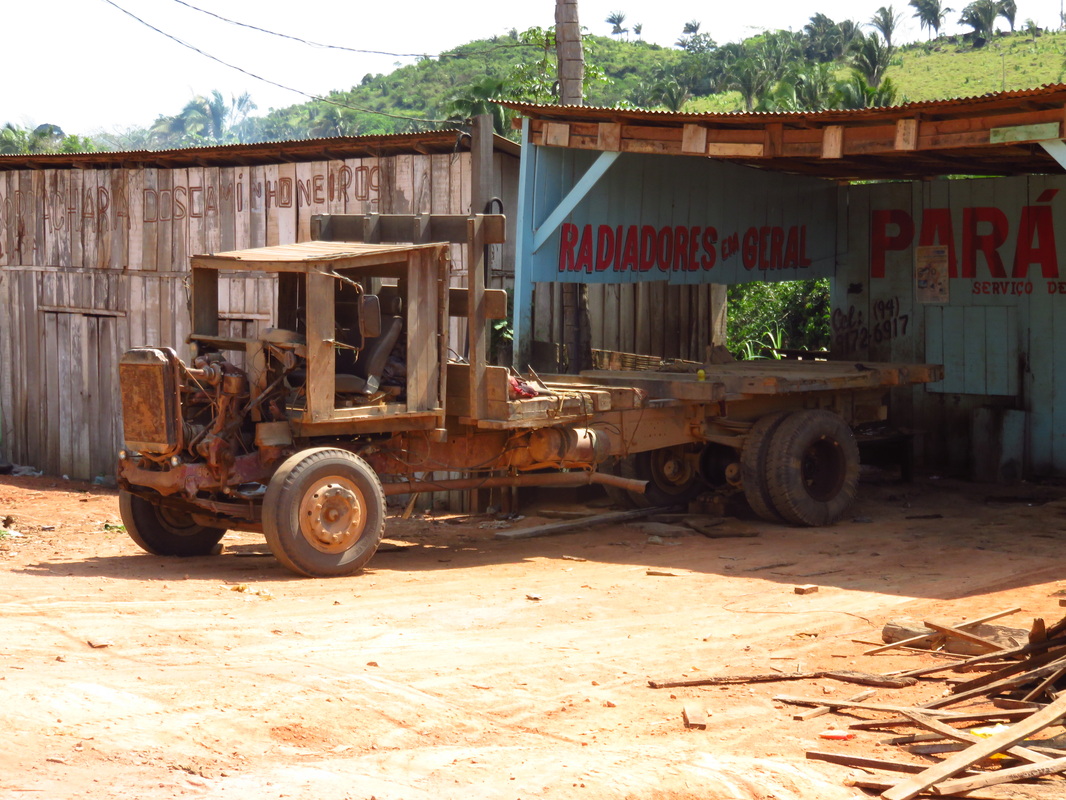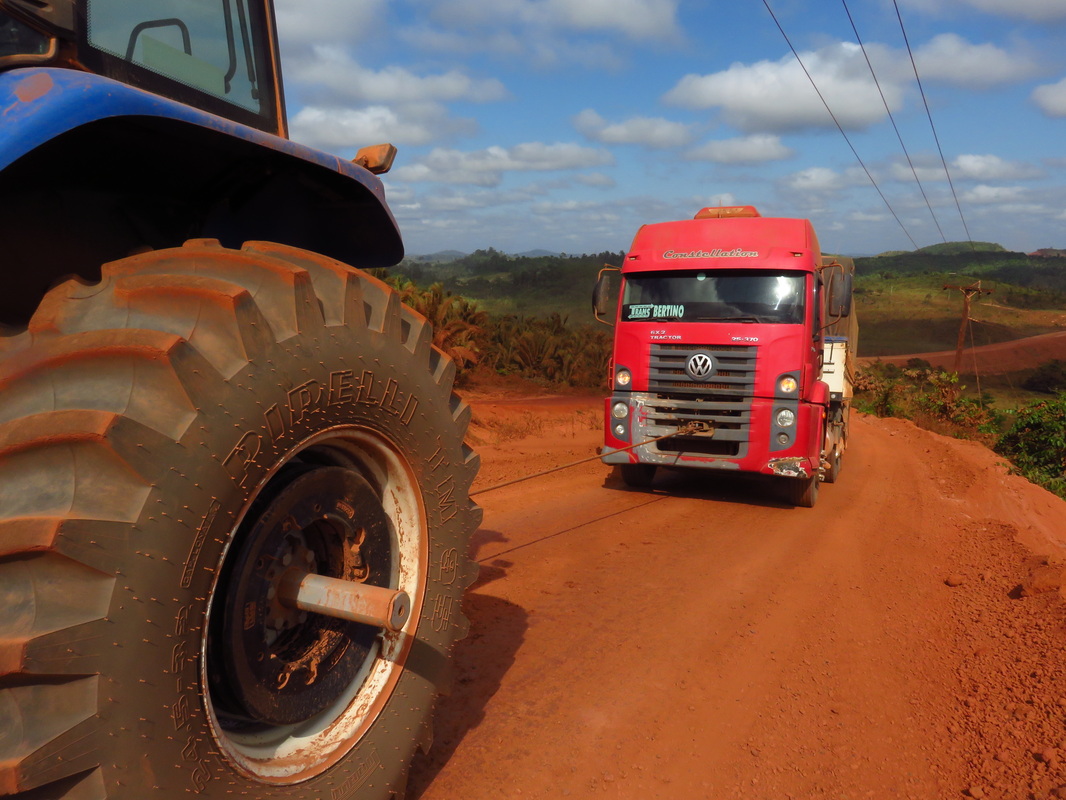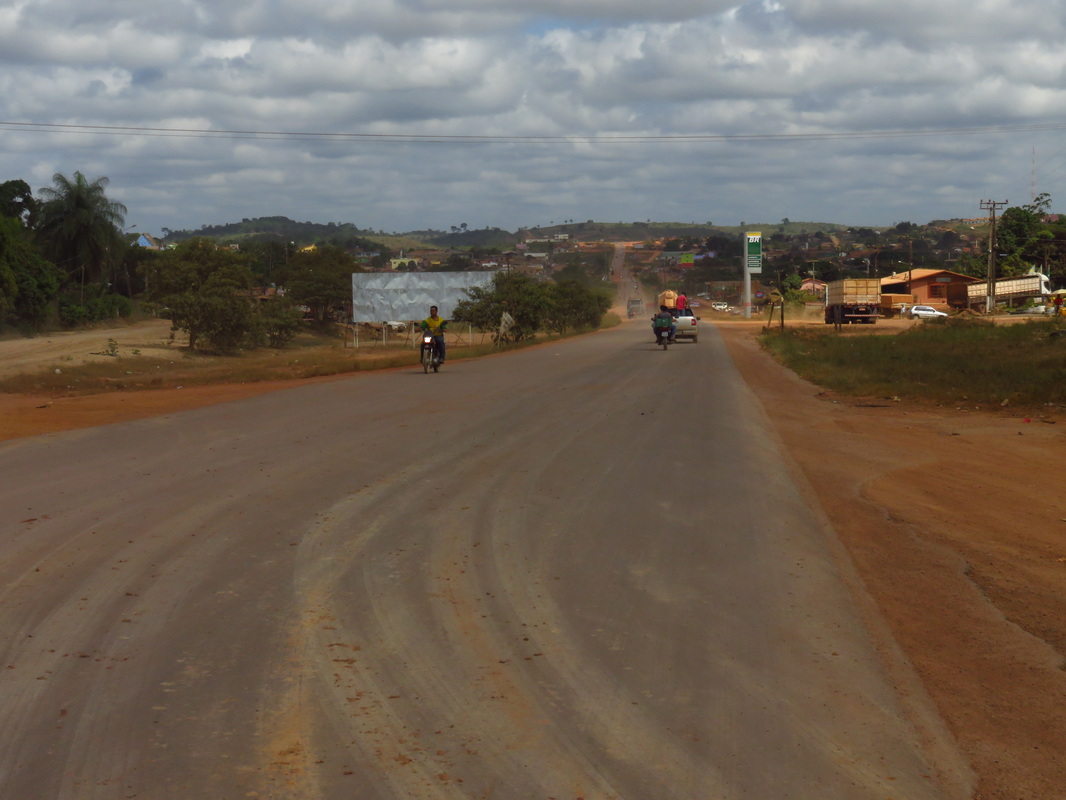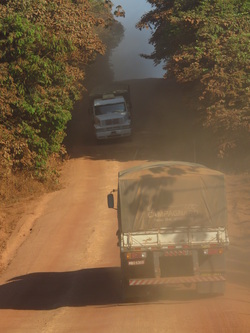
29/7/2014 Marabá to Caldo de Cana
D94, T8, Av14.85, max63, 31145, 5610
35, hot,dusty
My time in Marabá was largely spent just enjoying the unbelievably comfortable bed, coupled with the air conditioning. Having almost forgotten what a truly comfortable bed was like, coupled with the two firm pillows the cleaning ladies gave me, lying in the bed it was like my body was being caressed all over. It was so so good. I could not keep the smile off my face caused by the sensation.
Time was spent on the Sunday at the beach on the Rio Tocantins.
Eating was enjoyed on the streets in little restaurants where the food was incredibly cheap. My motel was in Novo Marabá. The Premier, I recommend it if you are looking for a bit of luxury, compared to a tent that is.
I tried to send some gear ahead to Santarem, as I am carrying many things that won’t be needed on the way there. For example, some winter clothes, spare parts, resistencias, and other items to reduce weight.
The problem was that they will only hold it in the receiving PO for 20 days and then will dispose of the package. Another problem is that many packages don’t make it to their destination and if they do, often they have been interfered with.
So, I will be taking the full load with me, some 50+ kg at a guess, more with water.
A huge breakfast was enjoyed before leaving. Leaving town I needed to veer left over the Rio Tocantins to head out of town on BR230.
Once just out of the urban area, the short steep climbs started, it would be up then straight back down and up again.
The asphalt continued for 44km, then, slowly petered out as road works were in situ. Brazil is making a big effort to tar large portions road.
Once on the dirt the dust was unbelievable, with the non existent wind, it just hung. My neck warmer was the only way to keep it out of my throat.
Everything within 100m of the road was heavily coated in the prolific powder. It was a wonder plants near the road could even photosynthesis, my guess is they didn’t till the wet season. They seem to have adapted, few were dying.
Traffic was mainly trucks, a few buses, lots of motos and a few cars.
Those travelling fast were really kicking up the filth.
The new road works were cutting all the hills in the process of reconstruction.
The first town came to had a sawmill and brickworks.
The whole place is an environmental compromise. Most roadside water was reddy brown on colour and not flowing. Most bridges had a set of new concrete foundations that had been built years ago but were now overgrown, these will no doubt be utilized as progress on reconstruction advances.
Soon out of the works, the steep little climbs began. The road just followsthe land contour.
Almost always using just the small front cog, effort was keep to a minimum. Soon I came to Cajazeiras. Here was a lanchonette with a great buffet.
By this time, I was the colour of the dust.
Litterally, it was all over me adhered to my sweat soaked clothes. At the eatery, a shower was taken.
Two large plates of food and 4 glasses of coco milk were enjoyed. An hour or more was spent here.
Leaving here all water containers were topped up. It was the kind of riding where the only way to proceed was to follow body rhythms. Setting any distances or goals would most definitely turn the ride into a nightmare.
I had water, and would just ride till I felt like stopping. Late in the day a church was passed. It was seriously contemplated whether or not to stop, there appeared to be water on site. A shame it was just a bit early.
A jungle camp would be just as good and more interesting.
The scenery now was that of primitively cleared land with Babacu palms the main remnants, cattle and goats were grazing. Gullies contained remnant vegetation.
Some ridges still had large remnant trees still grand and surveying the scene, this gave one a glimpse into how lush and diverse everything must have been.
Then in the middle of nowhere about 1730 here was a small pool bar on the side of the road.
The lady had ready prepared lemon juice, 4 glasses of this were enjoyed. As was an empanada.
She said I could camp under the awning for the night, which was great, there was water and light available.
It was close to the road and dusty, but who cared, not me.
Guys were playing pool till about 1900 hrs , she then closed up. The tent was set up on the concrete and not feeling to hungry, just noodles were enjoyed and lots of yerba mate to rehydrate.
Later,in bed my stomach was cycling with pain, it was that empanada I had eaten.
I knew the symptoms exactly. Sure enough come 2330, a trip was made outdoors and a full on purge took place. This took about 5 minutes, and left me feeling alot better afterwards.
I was soon asleep after this.
In my headlight during the early evening it was amazing to see just how much dust is really in the air. Evening when traffic was not passing it just hung.
30/7/2014 Caldo de Cana to 5km past Impresa Tuucurúi
D77, T10, Av12.49, max48, 31222, 5687
Another dry season day here at 4° latitude
Awaking early, everything felt good, body wise. Breakfast of porridge was devoured. The lady had not turned up so I left her a note to say thanks and a couple of tomatoes I did not need.
Riding was just the same, though more jungle was encountered now. Coming to the rise of one narrow section, a group of trucks could be seen parked up ahead. Riding on past them, there was a semi that had its whole deck twisted on the side of the road. It was still connected to the tractor unit. It had been carrying bags of cement to Altamira.
The road was only just passable for trucks.
Soon the pueblito of 112 come up, here was a cluster of lanchonettes and a couple of borracharias.
I stopped at the busiest one. It was really a bit early at 1100 to be stopping and eating. Though as said before I had to eat for the road ahead.
Here a few coconuts were drunk, a good shower was had, my blog updated and just enjoyed the comings and goings in one of these dusty Trans Amazon pueblitos.
Small buses were pulling in and the occupant would spill out and buy all sorts of food.
Interestingly all the buses had hitches at the front for being pulled from bogs.
There were many large semis with tanks for carrying cement, some were carrying timber, other furniture, people were moving in or out?
I stopped here for an hour and ate then headed off again.
I enjoyed a bright purple drink of Abacaí which is extracted from palm seeds here, it is a very bland kind of drink but has an interesting flavour, the Brasileros prefer it with lots of sugar.
Within 2km of leaving here all my clothes were soaked and covered in dust again. The humidity is about 85%, though it feels alot less.
Personally, I have only sweated this much on a couple of occasions. The heat is such that it has its advantages, my ultra light shirt allows the sweat to evaporate that fast that it actually has a cooling effect, this I like.
My camera now is kept zipped up in its bag inside the bar bag which is dust free thankfully.
The dust is so thick and lingering it acts as a sun screen, thats my story anyway.
A track was seen heading off the road with no vehicle tracks present, I pushed the bike up the steep climb and opened up an old taranaki gate.
Once the bike was out of sight, a wander was taken up the track. This led to a cleared area. This gave me a perfect insight into the slash and burn clearing technique. There were burnt logs scattered randomly across the messy landscape. Regrowth from palms was present. All clumps of grass had been grazed.
Walking into the remaining jungle, the plants encountered were all after me, some had thorns, others had hooks, some serrated, luckily none were the stinging kind, though some palms were literally covered in the most vicious looking black spines.
A column of ants was seen on the move, there were thousands of them all marching at a rapid pace. It just seemed endless. It was fascinating, things were happening with much urgency. I dared not disturb their cause.
On a straight section of road a woman was selling cheese outside her property, she was very friendly, about an hour was spent here talking to her. She had been on the 30 acre property with her husband and 2 children for seven years. They paid $15000 for the property. Her children spent 2 ½ hours on the bus each day going to school in Marabá. She yelled for a friend of hers children to come down to say hi. They learnt English at school and could understand bits of Spanish, we had a laugh for some time. She gave me coffee and cold water.
A regular clientele bought her homemade cheese. She was very attractive and told me she was of Italian descent.
From here as time was getting on, a farm house was visited to top up on drinking water. They told me a river was 14km on.
Almost all of the land on my left now is fully vegetated and is indigenous property, there were signs indicating this.
Monkeys could be heard calling in all the heavily vegetated areas.
Stopping at another outpost opposite the native lands. The woman said there were lots of people living across the road in the jungle.
It appeared they did not mix. These people were the intruders, they were a mixed lot, many rode motos in a state of repair that was wanting.
At the small shop, they were loading Abacaí seeds onto a truck.
I loaded with water for the night here.
It was hoped to camp at the river. Once here, a bridge was crossed and some cocos drunk at an incredibly wild looking establishment. There was junk everywhere, rubbish along the river shores and workboats tied up with nets aboard.
They were all propelled by the propeller on a long shaft. Snake boats as they are called in Thailand.
There was nowhere to camp, the land over the road was protected. I had to move on, it was now 1745 hrs. Sunset now is about 1830.
I had to find a dust free camp. Riding on, this looked like an impossibility. I stopped to put my lights on. Visibility in the low light coupled with the lingering dust created a dangerous situation.
I considered riding into the night,a campsite just could not be found. Anywhere that looked possible was dusted. In places the dust was just hanging suspended in large valleys
Then just on dark a track leading above the road with no fresh vehicle tracks was spotted. Waiting for no vehicles I hurridly and with much effort for this time of day, wheeled the bike up the grassed access.
Up there was a gate to a paddock with a bunch of cattle all gazing at me. There was plenty of road reserve.
There was dust up here but the amount was bearable.
I found a brilliant spot in tall grass well out of site and on a good sleeping slope. Pasta was had for dinner and lots of mate to rehydrate.
My cooking bowl was filled with water and a small towel used to wash all the dust off my legs and face. It was basic, but felt so good to be a little clean. The site was relatively ant free so the tent was used.
The fly is just draped over the apex and my lower body and legs. My face and upper body are under the stars. The air circulation is so much better.
This was one of the best campsites for sometime. Sleep came rapidly once in the tent.
31/7/2014 to Novo Repartimento
D15, T1, Av14.49, Maw38, 31232, 5702
High 30’s in town
Knowing Novo Repaartimento was only á short distance away, my time was taken leaving. The sloping sight had made for a comfy nights sleep.
A couple of coffees were enjoyed whilst my blog was updated, after this the rest of the pasta and tuna was eaten.
By about 0830 it was really hot again. Once packed, the road was entered when no traffic could be heard.
No sooner than on the road, a truck flew by. I got a full on dusting.
Already sweating there was much traffic about, all greeted me as they passed with a welcoming plume of air borne dirt.
Within 30 minutes I was drenched and covered in red dirt. Town was not far off, a steep little climb heralded the view.
It was like a wild west town. The local road block pulled me over and a few police asked me where I was from and going among other normal enquiring dialogue. They took some photos. They said like most people spoken to said they never see cyclists out here.
I can understand why.
For me, these hardships pale into insignificance when I think about the rewards both personal and visual upon arriving in Santarem on the shores of the Amazon River.
It is all part of the adventure, all part of the deepening appreciation, of many things I have always taken for granted.
Once in town, a truck wash in a shed was stopped at, the guys laughed, me likewise. I really did look like something the cat had bought home.
My appearance was akin to having been swimming in a mud slurry. The bike had a red brown hue as well.
They told me to head over the road to the Hotel Amazonas, it was cheap and had plenty of room out the back to wash the bike.
A room was booked for $10 a night, out the back water was cascading off the roof from an overflowing water tank. Here I stood and just let the cascade bath me in its coolness, it was so good.
Nothing else in the world mattered, then and there, just that cool water falling off my head and shoulders taking all the sweat and dirt with it.
Incidentally, there is ground water everywhere I go, people have water to spare. What’s more it is so sweet to drink. The town water, though drinkable is laced with chlorine.
The water at the hotel was coming from a well.
All my washing was done, first was whilst still being worn.
I later found out, two spokes on the rear wheel were broken. I took the chain of for a wash in petrol and put it down by a bag of salt.
In the room a cold shower with soap was cherished, it took two shampoos and conditioner to get the stringiness from my hair.
The salty sweat had matted it.
Once organised a wander into town was taken to get gas to clean the chain.
Here a supermarket was visited to get some fruit and replace what was eaten.
Arriving back at the motel, upon going to get the chain, some bugger had removed it.
Enquiring got me nowhere.
I change chains every 5000km, so it was due to be changed. Luckily, I had a new replacement.
The spokes were replaced and the wheel trued.
In town, the most common sights were, dust laden streets, motos, old trucks, hardened people, haphazard buildings, rubbish in the gutters and drains all coupled an air of casualness. It was a nice feel.
The heat was repressive.
For 6 months, it is as dry as a bone here and then 6 months of torrential rain. Talking with some guys I had met before on the road, we all agreed just a little dust settling shower would be unreal, but it doesn’t happen.
There were people working on old cars and trucks around the hotel area, there was stuff everywhere, nuts and bolts scattered among every other car part imaginable.
Some great news though, apparently the road to Altamira is largely asphalt.
1/8/2014 Novo Repartimento to Aratau Vila
D86,T5, Av17, max66, 31,323/5,788
Hot mid 30’s
I was up early, the room was a bit claustrophobic, the normal brekky was had. Stopping in town, a large bottle of water was bought to replace the bottle I had been carrying for a couple of weeks.
The road was indeed asphalt, it was so good to be out of the dust. The sweat started pouring about 5km into the trip and never stopped. It was all up and down.
A good shoulder was present to my right, this was used when traffic was on coming.
Again, the landscape where disturbed was mainly vegetated in Babacu palms. There were small properties everywhere.
At 1130, the vila of Maracajá was entered. Here, though early, lunch was enjoyed in a roadside tent with food lovingly cooked by a couple of chirpy middle aged woman who loved what they were doing as much as the customers loved their home cooked food.
Beef and chicken were eaten, with rice, beans and salad. It was a largely oil free meal.
From here, I just meandered along in no hurry just enjoying the scenery. Every low spot in the road had a pond on one side of the road. Many were idyllic looking spots fringed with palms and of a deep green colour.
Everything has a lushness in the landscape now.
One never goes hungry here in Brazil there are little restaurants everywhere. I was now riding in the heat of the day.
Really, I am getting used to the heat and humidity, just as long as I am keeping the water up and not over exerting. Choosing the right gear is so important. Rolling down hills, generally not starting to pedal again till my speed has been reduced to my second to lowest gear when arriving at the foot of the next hill. It is a good system. Minimizing gear changes and effort.
Coming to a pool bar, I pulled in and had a couple of cokes. Felling relaxed and tired. I locked the bike to a post, put the bar bag under my plastic chair and promptly fell asleep with my legs on another chair, with people around me. I slept for an hour or more.
When stopped I realise just how worn out my body is at times. It is nice feeling.
At 1600, loaded with water I headed off again. The day was cooling off, it was great.
There is a constant stream of trucks heading with cement powder to the controversial hydro power project on the Rio Xingu north of here.
Fires were burning sporadically, where trees had been cut down, allowed to dry and then set on fire.
At 1800, a town, Aratau, was arrived at. This was a classic pioneer place it was the colour of the dust. Trucks passing through and people just lingering along the roadside. All this was in a light cloud of the now familiar dust.
Pulling up to see if there was a motel here, a bunch of guys gathered around, we chatted for awhile about fishing, the road, weather and where was a motel. They told me there was one just around the corner. Heading in the direction they said. I came upon the pousada.
I asked the elderly pale skinned, reasonably distinguished gentleman, if he had accommodation. He told me they were closed. We chatted for awhile and he said I could camp inside his restaurant.
Anyway, Joseph was a lovely guy. He was a lawyer and had been an executive for Ford here in Brazil, incidentally he was 76 years of age and in good shape.
He could speak some English, learnt from his days at Ford. We talked for most of the evening.
Joseph had such an interesting story to tell. He wanted a change of life in the 70’s and came out here when they were building the Trans Amazon highway.
Back then, the military government were selling land as they built the road. Joseph bought a large 30 square kilometre parcel of jungle and hoped to make his fortune clearing it and raising cattle.
Military response
By early 1964, important sections of the military had developed a consensus that intervention in the political process was necessary. The development of this consensus was likely helped by important civilian politicians, such as José de Magalhães Pinto, governor of Minas Gerais, and the United States government. Though many in the right of the political spectrum claim the coup was "revolutionary," most historians agree that is not so, since there was no real transition of power; military dictatorship was the fastest way to implement neoliberal economic policies in the country while suppressing growing popular discontent, and the coup was thus a way for Brazil's already-ruling elite to secure its power.
At first, there was intense economic growth, due to neoliberal economic reforms, but in the later years of the dictatorship, the reforms had left the economy in shambles, with soaring inequality and national debt, and thousands of Brazilians were deported, imprisoned, tortured,[15] or murdered. Politically motivated deaths numbered in the hundreds, mostly related to the guerrilla-antiguerrilla warfare in the 1968–73 period; official censorship also led many artists into exile.
The Trans-Amazonian Highway
The Trans-Amazonian Highway was one of the most ambitious resettlement-economic development programs ever devised, and one of the greatest failures. In the 1970s, Brazil planned a 2,000-mile highway that would bisect the massive Amazon forest, opening rainforest lands to settlement by peasants from the crowded, drought-plagued north and development of its timber and mineral resources to maintain the country's impressive economic growth.
Colonists would be given 250-acre lots, six months' salary, and easy access to agricultural loans, in exchange for settling along the highway and converting the surrounding rainforest into agricultural land. The plan would grow to cost US$65,000 (1980 dollars) to settle each family, a staggering amount for Brazil, a developing country at the time.
The project was plagued from the start. The sediments of the Amazon Basin rendered the highway unstable and subject to inundation during heavy rains, blocking traffic and leaving crops to rot. Harvest yields for peasants were dismal, since the forest soils were quickly exhausted, and new forest had to be cleared annually. Logging was difficult due to the widely spaced distribution of commercially valuable trees. Rampant erosion, up to 40 tons of soil per acre (100 tons/ha), occurred after clearing. Many colonists, unfamiliar with banking and lured by easy credit, went deep into debt.
Adding to the economic and social failures of the project, were the long-term environmental costs. After the construction of the Trans-Amazonian Highway, Brazilian deforestation accelerated to levels never before seen, and vast swaths of forest were cleared for subsistence farmers and cattle-ranching schemes. The Trans-Amazonian Highway is a prime example of the environmental havoc that is caused by road construction in the rainforest.
He got the title papers to the land. Out the back of the property, away from the road, squatters started building shacks and living on it. Bearing in mind it was almost inaccessible.
He tried to get them off the property peacefully. They would not move. The local police and government did not have the resources or motivation to help him, he even took it to the courts.
To this day, some 35 years later he still has title to the land and there are thirty families living on his land.
This is such a classic story of the free for all during this period of carving this road through the jungle.
He hopes his grandchildren may get to occupy the land oneday.
He has a daughter, who came to visit him from Sao Paulo many years ago. She has never been back.
They were dining in his house on another small jungle block he owns when a huge spider crossed the table, as if this wasn’t enough, she was out on the deck reading in a deck chair when a large python slithered onto the deck and under her chair, she panicked. Joseph told her to stand on the chair. Well, this she did, all the while the huge creature was just going about its day.
Once on the chair and told not to panic that it wasn’t poisonous, one of her legs went through the weaving on the chair to the ground.
I can just imagine the fear in her eyes, she was a city girl here in the Amazon besieged by a living nightmare of spiders and snakes.
It was a good story, one that has never seen her come back.
The road to the entrance at both ends of Aratau is asphalt. The locals said they did not want tar because the road had to be raised, and their homes would be well below it. This had to be done to successfully build a bridge over the river which the town is named after.
Joseph was going to get a restaurant going in his large building. With all the dust just in town this is impossible. They will never come back to tar the 1km stretch through the town, he said.
Now that he is aging, he is selling up and going back to Sao Paulo.
It was such an enjoyable evening. Especially, hearing some history of the road from someone who was here from its conception. This little pueblito also housed the land administration office during construction. 1 man staffed it, so really, it was a free for all.
It was a privilege to her these stories, for me it gives me closer contact with my surroundings as progress is made along it.
Just 40km from town there are still people hand mining for gold in the hills.
It was great to shower and sleep indoors. I could never have guessed ending up in such circumstances for the evening. The town was not even on the map.
2/8/2014 Aratau to Pacajá
D23, T1.5, Av12.64, Max47, 31,346/5,811
Hot
Up early to greet Joseph who was busy in the kitchen at 0530. I cooked on my stove and had the normal. Joseph was interested in my gear, especially the stove.
We sat around and talked more. Finally, I got away about 0830.
He had told me about a cut the roads people were making in two mountains up ahead.
Leaving town was asphalt, this soon petered out and it was the reddish gravel again.
Up ahead the two ranges could be seen, so could alot of dust.
Though they were still working on the road, the climbs were unbelievably steep. At one point, a semi driver missed a gear and had to roll back down and start again.
At the summit, I spoke with a cement truck driver. He was on his way, unladen back to Belem for another load.
Going down the other side, there was a large 4x4 tractor pulling semis up the hill. The ones with timber on board were unable to get traction on the steep incline.
It was hard, to even imagine, this part of the road in the wet season.
Coming down, whilst looking at the scenery, I momentarily got out of control. It was so close to ending up in a 2 metre deep crevasse where water had just eaten away the side of the road. My brakes could not be used for fear of skidding into it. I hung on and free wheeled out of it, luckily there was open ground beyond.
Another short climb had me drawing on all reserves, it was steep and deep with talcum powder like dust.
With an effort close to exhaustion, it was scaled.
I was pleased with my recovery once at the top. Daring not to stop and let the sweat flow, the downhill run beyond cooled me off nicely.
From here, things eased up a bit and more asphalt commenced. All this new asphalt is only 1 year old, Joseph was saying.
Soon the township of Pacajá came into sight.
I saw a newish hotel, they had a sign up saying, wifi. Stopping here to check the delivery speed, it was actually very good.
The owners let me use it and things were updated for a couple of hours.
By now, it was decided to stop the night here. Progress to date on the road has been all good.
The hotel Triangalu was booked. Basic, probably exaggerates the establishments decription, but it will suffice just for the night. Some washing was done.
Next door, a restaurant had pork chicharon. It was an oilathon but who cares, it will be burnt off like petrol tomorrow.
The later part of the afternoon was spent sleeping with the fan sending a calming breeze over my body.
It was one of those days where it was nice just to do a few km and relax all afternoon out of the heat.
Upon waking, the whole town was littered with a black ash from fires somewhere.
During the dry season, I’m beginning to think people here must have a high blood dust count. It is so much a part of live here.
It is quite amazing how only since the road was built these towns have existed. Joseph was telling me that the rain in the wet season arrives at the end of each day and is amazingly heavy, looking at some of the eroded landscape near the road construction this is not hard to envisage.
D94, T8, Av14.85, max63, 31145, 5610
35, hot,dusty
My time in Marabá was largely spent just enjoying the unbelievably comfortable bed, coupled with the air conditioning. Having almost forgotten what a truly comfortable bed was like, coupled with the two firm pillows the cleaning ladies gave me, lying in the bed it was like my body was being caressed all over. It was so so good. I could not keep the smile off my face caused by the sensation.
Time was spent on the Sunday at the beach on the Rio Tocantins.
Eating was enjoyed on the streets in little restaurants where the food was incredibly cheap. My motel was in Novo Marabá. The Premier, I recommend it if you are looking for a bit of luxury, compared to a tent that is.
I tried to send some gear ahead to Santarem, as I am carrying many things that won’t be needed on the way there. For example, some winter clothes, spare parts, resistencias, and other items to reduce weight.
The problem was that they will only hold it in the receiving PO for 20 days and then will dispose of the package. Another problem is that many packages don’t make it to their destination and if they do, often they have been interfered with.
So, I will be taking the full load with me, some 50+ kg at a guess, more with water.
A huge breakfast was enjoyed before leaving. Leaving town I needed to veer left over the Rio Tocantins to head out of town on BR230.
Once just out of the urban area, the short steep climbs started, it would be up then straight back down and up again.
The asphalt continued for 44km, then, slowly petered out as road works were in situ. Brazil is making a big effort to tar large portions road.
Once on the dirt the dust was unbelievable, with the non existent wind, it just hung. My neck warmer was the only way to keep it out of my throat.
Everything within 100m of the road was heavily coated in the prolific powder. It was a wonder plants near the road could even photosynthesis, my guess is they didn’t till the wet season. They seem to have adapted, few were dying.
Traffic was mainly trucks, a few buses, lots of motos and a few cars.
Those travelling fast were really kicking up the filth.
The new road works were cutting all the hills in the process of reconstruction.
The first town came to had a sawmill and brickworks.
The whole place is an environmental compromise. Most roadside water was reddy brown on colour and not flowing. Most bridges had a set of new concrete foundations that had been built years ago but were now overgrown, these will no doubt be utilized as progress on reconstruction advances.
Soon out of the works, the steep little climbs began. The road just followsthe land contour.
Almost always using just the small front cog, effort was keep to a minimum. Soon I came to Cajazeiras. Here was a lanchonette with a great buffet.
By this time, I was the colour of the dust.
Litterally, it was all over me adhered to my sweat soaked clothes. At the eatery, a shower was taken.
Two large plates of food and 4 glasses of coco milk were enjoyed. An hour or more was spent here.
Leaving here all water containers were topped up. It was the kind of riding where the only way to proceed was to follow body rhythms. Setting any distances or goals would most definitely turn the ride into a nightmare.
I had water, and would just ride till I felt like stopping. Late in the day a church was passed. It was seriously contemplated whether or not to stop, there appeared to be water on site. A shame it was just a bit early.
A jungle camp would be just as good and more interesting.
The scenery now was that of primitively cleared land with Babacu palms the main remnants, cattle and goats were grazing. Gullies contained remnant vegetation.
Some ridges still had large remnant trees still grand and surveying the scene, this gave one a glimpse into how lush and diverse everything must have been.
Then in the middle of nowhere about 1730 here was a small pool bar on the side of the road.
The lady had ready prepared lemon juice, 4 glasses of this were enjoyed. As was an empanada.
She said I could camp under the awning for the night, which was great, there was water and light available.
It was close to the road and dusty, but who cared, not me.
Guys were playing pool till about 1900 hrs , she then closed up. The tent was set up on the concrete and not feeling to hungry, just noodles were enjoyed and lots of yerba mate to rehydrate.
Later,in bed my stomach was cycling with pain, it was that empanada I had eaten.
I knew the symptoms exactly. Sure enough come 2330, a trip was made outdoors and a full on purge took place. This took about 5 minutes, and left me feeling alot better afterwards.
I was soon asleep after this.
In my headlight during the early evening it was amazing to see just how much dust is really in the air. Evening when traffic was not passing it just hung.
30/7/2014 Caldo de Cana to 5km past Impresa Tuucurúi
D77, T10, Av12.49, max48, 31222, 5687
Another dry season day here at 4° latitude
Awaking early, everything felt good, body wise. Breakfast of porridge was devoured. The lady had not turned up so I left her a note to say thanks and a couple of tomatoes I did not need.
Riding was just the same, though more jungle was encountered now. Coming to the rise of one narrow section, a group of trucks could be seen parked up ahead. Riding on past them, there was a semi that had its whole deck twisted on the side of the road. It was still connected to the tractor unit. It had been carrying bags of cement to Altamira.
The road was only just passable for trucks.
Soon the pueblito of 112 come up, here was a cluster of lanchonettes and a couple of borracharias.
I stopped at the busiest one. It was really a bit early at 1100 to be stopping and eating. Though as said before I had to eat for the road ahead.
Here a few coconuts were drunk, a good shower was had, my blog updated and just enjoyed the comings and goings in one of these dusty Trans Amazon pueblitos.
Small buses were pulling in and the occupant would spill out and buy all sorts of food.
Interestingly all the buses had hitches at the front for being pulled from bogs.
There were many large semis with tanks for carrying cement, some were carrying timber, other furniture, people were moving in or out?
I stopped here for an hour and ate then headed off again.
I enjoyed a bright purple drink of Abacaí which is extracted from palm seeds here, it is a very bland kind of drink but has an interesting flavour, the Brasileros prefer it with lots of sugar.
Within 2km of leaving here all my clothes were soaked and covered in dust again. The humidity is about 85%, though it feels alot less.
Personally, I have only sweated this much on a couple of occasions. The heat is such that it has its advantages, my ultra light shirt allows the sweat to evaporate that fast that it actually has a cooling effect, this I like.
My camera now is kept zipped up in its bag inside the bar bag which is dust free thankfully.
The dust is so thick and lingering it acts as a sun screen, thats my story anyway.
A track was seen heading off the road with no vehicle tracks present, I pushed the bike up the steep climb and opened up an old taranaki gate.
Once the bike was out of sight, a wander was taken up the track. This led to a cleared area. This gave me a perfect insight into the slash and burn clearing technique. There were burnt logs scattered randomly across the messy landscape. Regrowth from palms was present. All clumps of grass had been grazed.
Walking into the remaining jungle, the plants encountered were all after me, some had thorns, others had hooks, some serrated, luckily none were the stinging kind, though some palms were literally covered in the most vicious looking black spines.
A column of ants was seen on the move, there were thousands of them all marching at a rapid pace. It just seemed endless. It was fascinating, things were happening with much urgency. I dared not disturb their cause.
On a straight section of road a woman was selling cheese outside her property, she was very friendly, about an hour was spent here talking to her. She had been on the 30 acre property with her husband and 2 children for seven years. They paid $15000 for the property. Her children spent 2 ½ hours on the bus each day going to school in Marabá. She yelled for a friend of hers children to come down to say hi. They learnt English at school and could understand bits of Spanish, we had a laugh for some time. She gave me coffee and cold water.
A regular clientele bought her homemade cheese. She was very attractive and told me she was of Italian descent.
From here as time was getting on, a farm house was visited to top up on drinking water. They told me a river was 14km on.
Almost all of the land on my left now is fully vegetated and is indigenous property, there were signs indicating this.
Monkeys could be heard calling in all the heavily vegetated areas.
Stopping at another outpost opposite the native lands. The woman said there were lots of people living across the road in the jungle.
It appeared they did not mix. These people were the intruders, they were a mixed lot, many rode motos in a state of repair that was wanting.
At the small shop, they were loading Abacaí seeds onto a truck.
I loaded with water for the night here.
It was hoped to camp at the river. Once here, a bridge was crossed and some cocos drunk at an incredibly wild looking establishment. There was junk everywhere, rubbish along the river shores and workboats tied up with nets aboard.
They were all propelled by the propeller on a long shaft. Snake boats as they are called in Thailand.
There was nowhere to camp, the land over the road was protected. I had to move on, it was now 1745 hrs. Sunset now is about 1830.
I had to find a dust free camp. Riding on, this looked like an impossibility. I stopped to put my lights on. Visibility in the low light coupled with the lingering dust created a dangerous situation.
I considered riding into the night,a campsite just could not be found. Anywhere that looked possible was dusted. In places the dust was just hanging suspended in large valleys
Then just on dark a track leading above the road with no fresh vehicle tracks was spotted. Waiting for no vehicles I hurridly and with much effort for this time of day, wheeled the bike up the grassed access.
Up there was a gate to a paddock with a bunch of cattle all gazing at me. There was plenty of road reserve.
There was dust up here but the amount was bearable.
I found a brilliant spot in tall grass well out of site and on a good sleeping slope. Pasta was had for dinner and lots of mate to rehydrate.
My cooking bowl was filled with water and a small towel used to wash all the dust off my legs and face. It was basic, but felt so good to be a little clean. The site was relatively ant free so the tent was used.
The fly is just draped over the apex and my lower body and legs. My face and upper body are under the stars. The air circulation is so much better.
This was one of the best campsites for sometime. Sleep came rapidly once in the tent.
31/7/2014 to Novo Repartimento
D15, T1, Av14.49, Maw38, 31232, 5702
High 30’s in town
Knowing Novo Repaartimento was only á short distance away, my time was taken leaving. The sloping sight had made for a comfy nights sleep.
A couple of coffees were enjoyed whilst my blog was updated, after this the rest of the pasta and tuna was eaten.
By about 0830 it was really hot again. Once packed, the road was entered when no traffic could be heard.
No sooner than on the road, a truck flew by. I got a full on dusting.
Already sweating there was much traffic about, all greeted me as they passed with a welcoming plume of air borne dirt.
Within 30 minutes I was drenched and covered in red dirt. Town was not far off, a steep little climb heralded the view.
It was like a wild west town. The local road block pulled me over and a few police asked me where I was from and going among other normal enquiring dialogue. They took some photos. They said like most people spoken to said they never see cyclists out here.
I can understand why.
For me, these hardships pale into insignificance when I think about the rewards both personal and visual upon arriving in Santarem on the shores of the Amazon River.
It is all part of the adventure, all part of the deepening appreciation, of many things I have always taken for granted.
Once in town, a truck wash in a shed was stopped at, the guys laughed, me likewise. I really did look like something the cat had bought home.
My appearance was akin to having been swimming in a mud slurry. The bike had a red brown hue as well.
They told me to head over the road to the Hotel Amazonas, it was cheap and had plenty of room out the back to wash the bike.
A room was booked for $10 a night, out the back water was cascading off the roof from an overflowing water tank. Here I stood and just let the cascade bath me in its coolness, it was so good.
Nothing else in the world mattered, then and there, just that cool water falling off my head and shoulders taking all the sweat and dirt with it.
Incidentally, there is ground water everywhere I go, people have water to spare. What’s more it is so sweet to drink. The town water, though drinkable is laced with chlorine.
The water at the hotel was coming from a well.
All my washing was done, first was whilst still being worn.
I later found out, two spokes on the rear wheel were broken. I took the chain of for a wash in petrol and put it down by a bag of salt.
In the room a cold shower with soap was cherished, it took two shampoos and conditioner to get the stringiness from my hair.
The salty sweat had matted it.
Once organised a wander into town was taken to get gas to clean the chain.
Here a supermarket was visited to get some fruit and replace what was eaten.
Arriving back at the motel, upon going to get the chain, some bugger had removed it.
Enquiring got me nowhere.
I change chains every 5000km, so it was due to be changed. Luckily, I had a new replacement.
The spokes were replaced and the wheel trued.
In town, the most common sights were, dust laden streets, motos, old trucks, hardened people, haphazard buildings, rubbish in the gutters and drains all coupled an air of casualness. It was a nice feel.
The heat was repressive.
For 6 months, it is as dry as a bone here and then 6 months of torrential rain. Talking with some guys I had met before on the road, we all agreed just a little dust settling shower would be unreal, but it doesn’t happen.
There were people working on old cars and trucks around the hotel area, there was stuff everywhere, nuts and bolts scattered among every other car part imaginable.
Some great news though, apparently the road to Altamira is largely asphalt.
1/8/2014 Novo Repartimento to Aratau Vila
D86,T5, Av17, max66, 31,323/5,788
Hot mid 30’s
I was up early, the room was a bit claustrophobic, the normal brekky was had. Stopping in town, a large bottle of water was bought to replace the bottle I had been carrying for a couple of weeks.
The road was indeed asphalt, it was so good to be out of the dust. The sweat started pouring about 5km into the trip and never stopped. It was all up and down.
A good shoulder was present to my right, this was used when traffic was on coming.
Again, the landscape where disturbed was mainly vegetated in Babacu palms. There were small properties everywhere.
At 1130, the vila of Maracajá was entered. Here, though early, lunch was enjoyed in a roadside tent with food lovingly cooked by a couple of chirpy middle aged woman who loved what they were doing as much as the customers loved their home cooked food.
Beef and chicken were eaten, with rice, beans and salad. It was a largely oil free meal.
From here, I just meandered along in no hurry just enjoying the scenery. Every low spot in the road had a pond on one side of the road. Many were idyllic looking spots fringed with palms and of a deep green colour.
Everything has a lushness in the landscape now.
One never goes hungry here in Brazil there are little restaurants everywhere. I was now riding in the heat of the day.
Really, I am getting used to the heat and humidity, just as long as I am keeping the water up and not over exerting. Choosing the right gear is so important. Rolling down hills, generally not starting to pedal again till my speed has been reduced to my second to lowest gear when arriving at the foot of the next hill. It is a good system. Minimizing gear changes and effort.
Coming to a pool bar, I pulled in and had a couple of cokes. Felling relaxed and tired. I locked the bike to a post, put the bar bag under my plastic chair and promptly fell asleep with my legs on another chair, with people around me. I slept for an hour or more.
When stopped I realise just how worn out my body is at times. It is nice feeling.
At 1600, loaded with water I headed off again. The day was cooling off, it was great.
There is a constant stream of trucks heading with cement powder to the controversial hydro power project on the Rio Xingu north of here.
Fires were burning sporadically, where trees had been cut down, allowed to dry and then set on fire.
At 1800, a town, Aratau, was arrived at. This was a classic pioneer place it was the colour of the dust. Trucks passing through and people just lingering along the roadside. All this was in a light cloud of the now familiar dust.
Pulling up to see if there was a motel here, a bunch of guys gathered around, we chatted for awhile about fishing, the road, weather and where was a motel. They told me there was one just around the corner. Heading in the direction they said. I came upon the pousada.
I asked the elderly pale skinned, reasonably distinguished gentleman, if he had accommodation. He told me they were closed. We chatted for awhile and he said I could camp inside his restaurant.
Anyway, Joseph was a lovely guy. He was a lawyer and had been an executive for Ford here in Brazil, incidentally he was 76 years of age and in good shape.
He could speak some English, learnt from his days at Ford. We talked for most of the evening.
Joseph had such an interesting story to tell. He wanted a change of life in the 70’s and came out here when they were building the Trans Amazon highway.
Back then, the military government were selling land as they built the road. Joseph bought a large 30 square kilometre parcel of jungle and hoped to make his fortune clearing it and raising cattle.
Military response
By early 1964, important sections of the military had developed a consensus that intervention in the political process was necessary. The development of this consensus was likely helped by important civilian politicians, such as José de Magalhães Pinto, governor of Minas Gerais, and the United States government. Though many in the right of the political spectrum claim the coup was "revolutionary," most historians agree that is not so, since there was no real transition of power; military dictatorship was the fastest way to implement neoliberal economic policies in the country while suppressing growing popular discontent, and the coup was thus a way for Brazil's already-ruling elite to secure its power.
At first, there was intense economic growth, due to neoliberal economic reforms, but in the later years of the dictatorship, the reforms had left the economy in shambles, with soaring inequality and national debt, and thousands of Brazilians were deported, imprisoned, tortured,[15] or murdered. Politically motivated deaths numbered in the hundreds, mostly related to the guerrilla-antiguerrilla warfare in the 1968–73 period; official censorship also led many artists into exile.
The Trans-Amazonian Highway
The Trans-Amazonian Highway was one of the most ambitious resettlement-economic development programs ever devised, and one of the greatest failures. In the 1970s, Brazil planned a 2,000-mile highway that would bisect the massive Amazon forest, opening rainforest lands to settlement by peasants from the crowded, drought-plagued north and development of its timber and mineral resources to maintain the country's impressive economic growth.
Colonists would be given 250-acre lots, six months' salary, and easy access to agricultural loans, in exchange for settling along the highway and converting the surrounding rainforest into agricultural land. The plan would grow to cost US$65,000 (1980 dollars) to settle each family, a staggering amount for Brazil, a developing country at the time.
The project was plagued from the start. The sediments of the Amazon Basin rendered the highway unstable and subject to inundation during heavy rains, blocking traffic and leaving crops to rot. Harvest yields for peasants were dismal, since the forest soils were quickly exhausted, and new forest had to be cleared annually. Logging was difficult due to the widely spaced distribution of commercially valuable trees. Rampant erosion, up to 40 tons of soil per acre (100 tons/ha), occurred after clearing. Many colonists, unfamiliar with banking and lured by easy credit, went deep into debt.
Adding to the economic and social failures of the project, were the long-term environmental costs. After the construction of the Trans-Amazonian Highway, Brazilian deforestation accelerated to levels never before seen, and vast swaths of forest were cleared for subsistence farmers and cattle-ranching schemes. The Trans-Amazonian Highway is a prime example of the environmental havoc that is caused by road construction in the rainforest.
He got the title papers to the land. Out the back of the property, away from the road, squatters started building shacks and living on it. Bearing in mind it was almost inaccessible.
He tried to get them off the property peacefully. They would not move. The local police and government did not have the resources or motivation to help him, he even took it to the courts.
To this day, some 35 years later he still has title to the land and there are thirty families living on his land.
This is such a classic story of the free for all during this period of carving this road through the jungle.
He hopes his grandchildren may get to occupy the land oneday.
He has a daughter, who came to visit him from Sao Paulo many years ago. She has never been back.
They were dining in his house on another small jungle block he owns when a huge spider crossed the table, as if this wasn’t enough, she was out on the deck reading in a deck chair when a large python slithered onto the deck and under her chair, she panicked. Joseph told her to stand on the chair. Well, this she did, all the while the huge creature was just going about its day.
Once on the chair and told not to panic that it wasn’t poisonous, one of her legs went through the weaving on the chair to the ground.
I can just imagine the fear in her eyes, she was a city girl here in the Amazon besieged by a living nightmare of spiders and snakes.
It was a good story, one that has never seen her come back.
The road to the entrance at both ends of Aratau is asphalt. The locals said they did not want tar because the road had to be raised, and their homes would be well below it. This had to be done to successfully build a bridge over the river which the town is named after.
Joseph was going to get a restaurant going in his large building. With all the dust just in town this is impossible. They will never come back to tar the 1km stretch through the town, he said.
Now that he is aging, he is selling up and going back to Sao Paulo.
It was such an enjoyable evening. Especially, hearing some history of the road from someone who was here from its conception. This little pueblito also housed the land administration office during construction. 1 man staffed it, so really, it was a free for all.
It was a privilege to her these stories, for me it gives me closer contact with my surroundings as progress is made along it.
Just 40km from town there are still people hand mining for gold in the hills.
It was great to shower and sleep indoors. I could never have guessed ending up in such circumstances for the evening. The town was not even on the map.
2/8/2014 Aratau to Pacajá
D23, T1.5, Av12.64, Max47, 31,346/5,811
Hot
Up early to greet Joseph who was busy in the kitchen at 0530. I cooked on my stove and had the normal. Joseph was interested in my gear, especially the stove.
We sat around and talked more. Finally, I got away about 0830.
He had told me about a cut the roads people were making in two mountains up ahead.
Leaving town was asphalt, this soon petered out and it was the reddish gravel again.
Up ahead the two ranges could be seen, so could alot of dust.
Though they were still working on the road, the climbs were unbelievably steep. At one point, a semi driver missed a gear and had to roll back down and start again.
At the summit, I spoke with a cement truck driver. He was on his way, unladen back to Belem for another load.
Going down the other side, there was a large 4x4 tractor pulling semis up the hill. The ones with timber on board were unable to get traction on the steep incline.
It was hard, to even imagine, this part of the road in the wet season.
Coming down, whilst looking at the scenery, I momentarily got out of control. It was so close to ending up in a 2 metre deep crevasse where water had just eaten away the side of the road. My brakes could not be used for fear of skidding into it. I hung on and free wheeled out of it, luckily there was open ground beyond.
Another short climb had me drawing on all reserves, it was steep and deep with talcum powder like dust.
With an effort close to exhaustion, it was scaled.
I was pleased with my recovery once at the top. Daring not to stop and let the sweat flow, the downhill run beyond cooled me off nicely.
From here, things eased up a bit and more asphalt commenced. All this new asphalt is only 1 year old, Joseph was saying.
Soon the township of Pacajá came into sight.
I saw a newish hotel, they had a sign up saying, wifi. Stopping here to check the delivery speed, it was actually very good.
The owners let me use it and things were updated for a couple of hours.
By now, it was decided to stop the night here. Progress to date on the road has been all good.
The hotel Triangalu was booked. Basic, probably exaggerates the establishments decription, but it will suffice just for the night. Some washing was done.
Next door, a restaurant had pork chicharon. It was an oilathon but who cares, it will be burnt off like petrol tomorrow.
The later part of the afternoon was spent sleeping with the fan sending a calming breeze over my body.
It was one of those days where it was nice just to do a few km and relax all afternoon out of the heat.
Upon waking, the whole town was littered with a black ash from fires somewhere.
During the dry season, I’m beginning to think people here must have a high blood dust count. It is so much a part of live here.
It is quite amazing how only since the road was built these towns have existed. Joseph was telling me that the rain in the wet season arrives at the end of each day and is amazingly heavy, looking at some of the eroded landscape near the road construction this is not hard to envisage.
